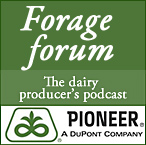Recently, several organic organizations from Maine to California formed a national network called Federation of Organic Dairy Farmers (FOOD). The group was formed by the Northeast Organic Dairy Producers Alliance, the Midwest Organic Dairy Producers Association and the Western Organic Dairy Producers Alliance. Combined, they represent more than 7850 organic dairies across the country. The group met in Wisconsin to discuss issues specific to their niche in the industry, and specifically, seeks to initiate stronger pasture requirements.
They unanimously support adding additional federal regulatory language to clarify that production of organic milk requires that organic dairy animals must consume at least 30% of their food needs (dry matter intake) from pasture for the entire growing season, for no less than 120 days.

 Dairy Markets Week in Review
Dairy Markets Week in Review
 The visit I have planned to DC this weekend will pale in comparision to the
The visit I have planned to DC this weekend will pale in comparision to the 

 You may soon be able to
You may soon be able to  Among seed genetics, alfalfa is a non-conformist. Due to biological limitations, achieving the genetic uniformity that occurs in corn, soybeans, wheat, etc. is not possible. Within each alfalfa variety, there is a range of performance for critical agronomic categories. As explained by Dave Miller, Alfalfa Research Director for Pioneer Hi-Bred, this is why ratings for disease and insect resistance, fall dormancy and winterkill are characterized in the context of average percentages–bag-by-bag, stand-by-stand, plot-by-plot.
Among seed genetics, alfalfa is a non-conformist. Due to biological limitations, achieving the genetic uniformity that occurs in corn, soybeans, wheat, etc. is not possible. Within each alfalfa variety, there is a range of performance for critical agronomic categories. As explained by Dave Miller, Alfalfa Research Director for Pioneer Hi-Bred, this is why ratings for disease and insect resistance, fall dormancy and winterkill are characterized in the context of average percentages–bag-by-bag, stand-by-stand, plot-by-plot.
 The Land O’Lakes annual meeting took place February 21-22 in Minneapolis, Minn. The meeting included LOL’s board of directors
The Land O’Lakes annual meeting took place February 21-22 in Minneapolis, Minn. The meeting included LOL’s board of directors